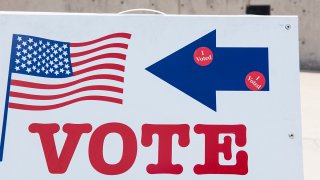
MINNEAPOLIS, MN – AUGUST 14: Signs direct voters outside the Weisman Art Museum polling place during the 2018 Minnesota primary election on August 14, 2018 in Minneapolis, Minnesota. Connecticut, Vermont and Wisconsin are also holding primaries today. (Photo by Stephen Maturen/Getty Images)
Noncitizens will be allowed to vote in local elections in two Vermont cities — Winooski and Montpelier — on Tuesday during the state’s annual Town Meeting day.
In Winooski, a city of about 7,300 that is home to immigrants from around the world, 37 noncitizens had registered to vote by early Monday, according to the city clerk. Same-day voter registration will allow potentially more people to sign up on Tuesday. The city estimates that it has more than 600 noncitizen residents.
“We are excited to run our first local election with All Resident Voting available,” said Winooski Mayor Kristine Lott by email.
Just five noncitizens had registered to vote in Montpelier as of Monday, according to the city clerk.
Get New England news, weather forecasts and entertainment stories to your inbox. Sign up for NECN newsletters.
The two small Vermont cities are part of more than a dozen communities across the United States to allow noncitizens to cast ballots in local elections, including 11 towns in Maryland. And in New York City more than 800,000 noncitizens will be allowed to vote in municipal elections next year after Mayor Eric Adams allowed legislation to automatically become law in January.
In Winooski, a community conversation started about three years ago to expand the right to vote on local issues to more neighbors, and in 2020, 70% of Winooski voters approved the change, the mayor said. The Democrat-controlled Vermont Legislature went on to approve the two separate bills to change the municipal charters of Winooski and Montpelier to allow legal residents who are not U.S. citizens to vote in local elections but Republican Gov. Phil Scott vetoed the measures last June. He said that allowing a town-by-town approach creates inconsistency in election policy and a “separate and unequal classes of residents potentially eligible to vote on local issue.” The Legislature overrode his vetoes.
The Republican National Committee filed lawsuits against the two Vermont cities asking judges to declare noncitizen voting unconstitutional.